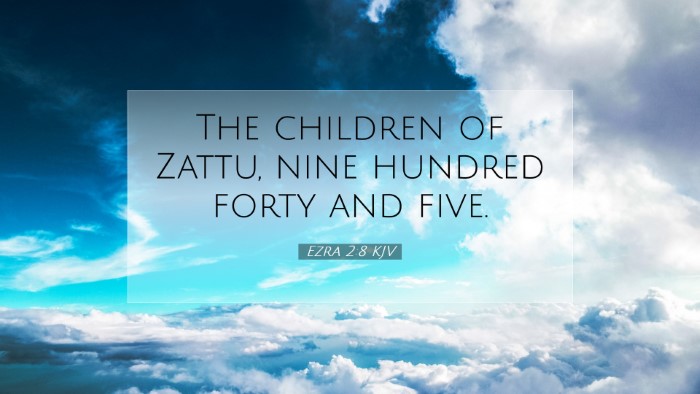Commentary on Ezra 2:8
Ezra 2:8 - "The children of Shephatiah, three hundred seventy and two."
Introduction
The return of the exiles from Babylon is a significant event in Jewish history, marking the beginning of a new chapter after the Babylonian captivity. Ezra 2 provides a detailed genealogy of those who returned, emphasizing the restoration of Israel's identity and covenant community. This commentary delves into the insights from various public domain sources to unpack the lessons and implications of Ezra 2:8 for contemporary readers.
Historical Context
The context of Ezra's narrative is crucial for understanding the significance of the numbers and names presented. After the decree of Cyrus, the Israelites were permitted to return to Jerusalem in 538 B.C. This passage highlights not just numbers but also the restoration of family lineage. According to Matthew Henry, each name represents a piece of the collective identity of the Jewish people, underscoring the importance of heritage.
Analysis of Shephatiah and His Family
The name Shephatiah itself translates to "the Lord has judged," which can carry deep theological implications regarding divine justice and restoration. Albert Barnes notes that the name signifies God's involvement in the lives of His people, especially during their return from exile, reminding them that their journey is not merely physical but also spiritual.
The number associated with Shephatiah's descendants—three hundred seventy and two—might seem merely numerical; however, it conveys a sense of community and revival among the returning exiles, indicative of God's promise that the remnant would be restored.
Theological Implications
Throughout scripture, God maintains His covenant with Israel, and this passage serves as a testament to faithfulness. As Adam Clarke suggests, the mention of these individuals in the genealogical record underscores God's commitment to His promises, reflecting a remnant that would be the foundation for the renewed nation.
-
Divine Justice:
The return of Shephatiah’s descendants illustrates the fulfillment of God’s judgment, wherein He restores rather than completely annihilates. This aspect emphasizes God's mercy even amidst consequences.
-
Community Restoration:
The number of returnees is indicative of a revived community. Each individual recounts a story of pain, loss, and ultimately, restoration, which speaks to the communal aspect of salvation.
Applications for Today
The significance of Ezra 2:8 for contemporary believers is multifaceted. It provides pastoral insights into the themes of restoration and hope. For theologians and scholars alike, understanding this genealogy is critical for appreciating the overarching narrative of scripture, where God continually preserves a remnant.
-
Encouragement in Trials:
Just as the exiles faced tremendous adversity, modern believers can draw strength from God's promises amid their challenges.
-
Importance of Heritage:
Understanding one's spiritual heritage fosters a deeper appreciation for God's work across generations, connecting past, present, and future.
-
Community in Faith:
As the returning Israelites illustrate, faith is not an isolated journey but a communal experience. Building and participating in a faith community remains essential.
Conclusion
In summary, Ezra 2:8 serves not merely as a record of numbers or names, but as a profound testament to God's unchanging nature and His covenant with His people. The insights gleaned from Matthew Henry, Albert Barnes, and Adam Clarke highlight the richness of this verse, encouraging pastors, students, and scholars to reflect on the relevance of biblical genealogies in our understanding of redemption and community.


